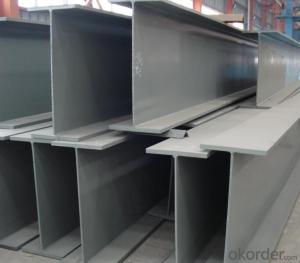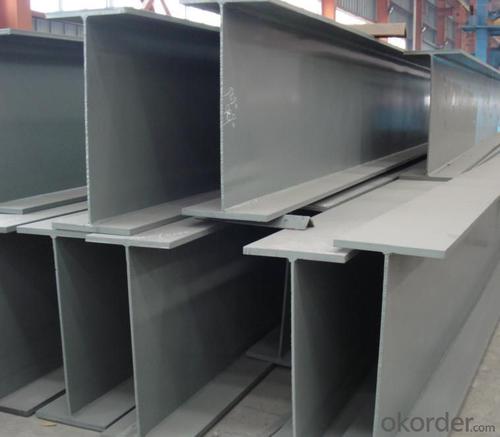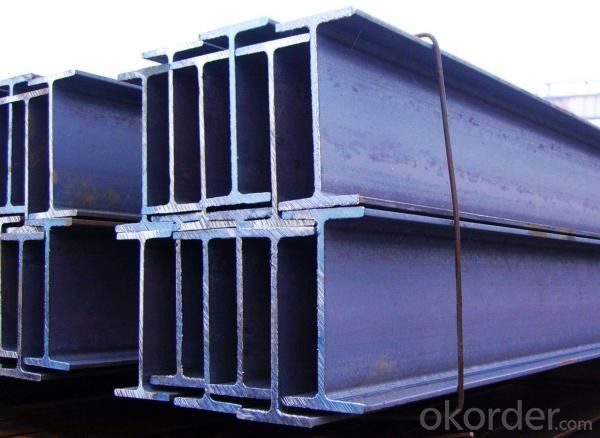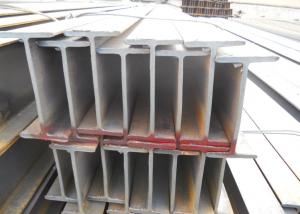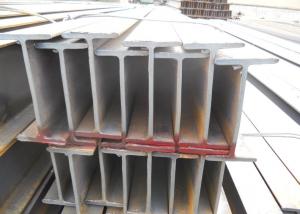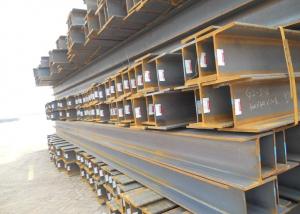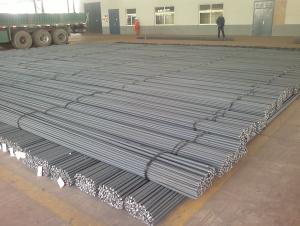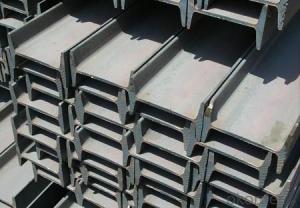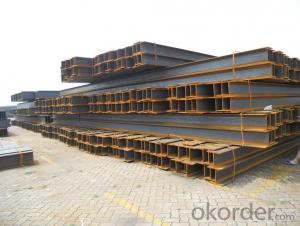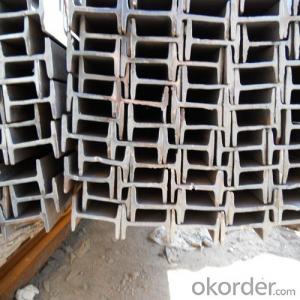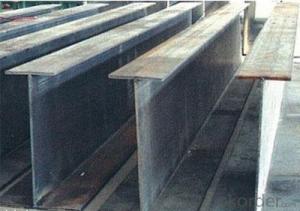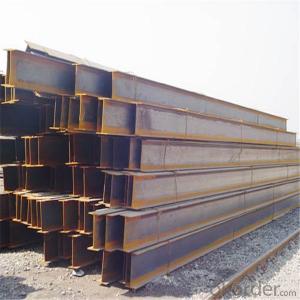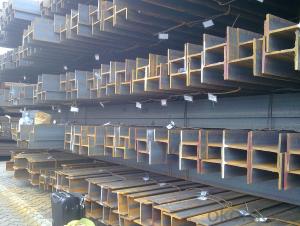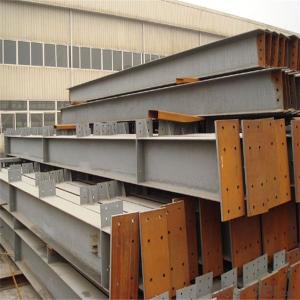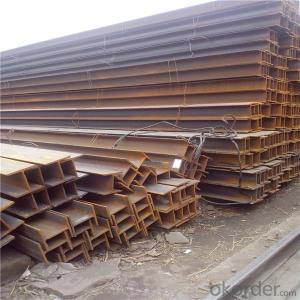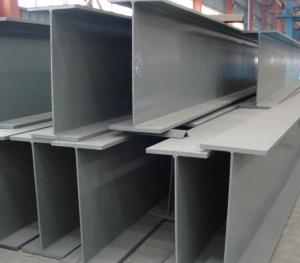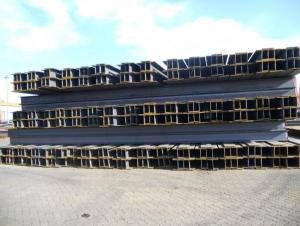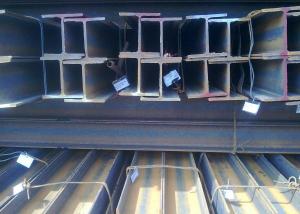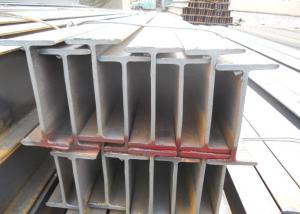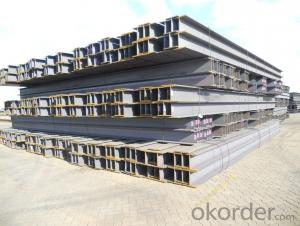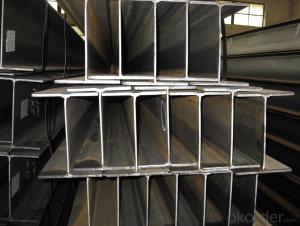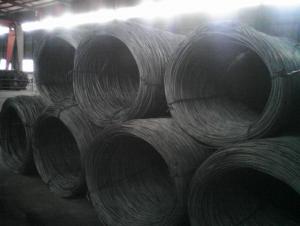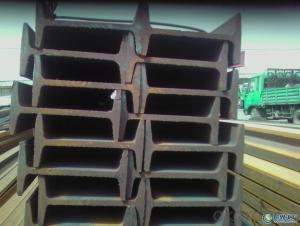Galvanized H Beam with High Quality for Sale
- Loading Port:
- Tianjin
- Payment Terms:
- TT or LC
- Min Order Qty:
- 50 m.t.
- Supply Capability:
- 10000 m.t./month
OKorder Service Pledge
OKorder Financial Service
You Might Also Like
Product Description:
1. Invoicing on theoretical weight or actual weight as customer request
2. Length: 6m, 12m as following table
3. Sizes:Zinc Thickness :15-80μ
Model Number | specification | sectional area | theoretical weight | |||
H*B | t1 | t2 | r | kg/m | ||
100*100 | 100*100 | 6 | 8 | 10 | 21.9 | 17.2 |
175*175 | 175*175 | 7.5 | 11 | 13 | 51.43 | 40.3 |
200*200 | 200*200 | 8 | 12 | 16 | 64.28 | 50.5 |
200*200 | 200*204 | 12 | 12 | 16 | 72.28 | 56.7 |
250*250 | 244*252 | 11 | 11 | 16 | 82.05 | 64.4 |
250*250 | 250*250 | 9 | 14 | 16 | 92.18 | 72.4 |
250*250 | 250*255 | 14 | 14 | 16 | 104.7 | 82.2 |
300*300 | 294*302 | 12 | 12 | 20 | 108.3 | 85 |
300*300 | 300*300 | 10 | 15 | 20 | 120.4 | 94.5 |
300*300 | 300*305 | 15 | 15 | 20 | 135.4 | 106 |
350*350 | 338*351 | 13 | 13 | 20 | 135.3 | 106 |
350*350 | 344*348 | 10 | 16 | 20 | 146 | 115 |
350*350 | 344*354 | 16 | 16 | 20 | 166.6 | 131 |
350*350 | 350*350 | 12 | 19 | 20 | 173.9 | 137 |
350*350 | 350*357 | 19 | 19 | 20 | 198.4 | 156 |
400*400 | 388*402 | 15 | 15 | 24 | 179.2 | 141 |
400*400 | 394*398 | 11 | 18 | 24 | 187.6 | 147 |
400*400 | 394*405 | 18 | 18 | 24 | 215.2 | 169 |
400*400 | 400*400 | 13 | 21 | 24 | 219.5 | 172 |
400*400 | 414*405 | 18 | 28 | 24 | 296.2 | 233 |
400*400 | 400*408 | 21 | 21 | 24 | 251.5 | 197 |
400*400 | 428*407 | 20 | 35 | 24 | 361.4 | 284 |
600*200 | 606*201 | 12 | 20 | 24 | 153.3 | 120 |
700*300 | 692*300 | 13 | 20 | 28 | 211.5 | 166 |
700*300 | 700*300 | 13 | 24 | 28 | 235.5 | 185 |
200*150 | 194*150 | 6 | 9 | 16 | 39.76 | 31.2 |
200*175 | 244*175 | 7 | 11 | 16 | 56.24 | 44.1 |
300*200 | 294*200 | 8 | 12 | 20 | 73.03 | 57.3 |
350*250 | 340*250 | 9 | 14 | 20 | 101.5 | 79.7 |
400*300 | 390*300 | 10 | 16 | 24 | 136.7 | 107 |
450*300 | 440*300 | 11 | 18 | 24 | 157.4 | 124 |
500*300 | 482*300 | 11 | 15 | 28 | 146.4 | 115 |
500*300 | 488*300 | 11 | 18 | 28 | 164.4 | 129 |
600*300 | 582*300 | 12 | 17 | 28 | 174.5 | 137 |
600*300 | 588*300 | 12 | 20 | 28 | 192.5 | 151 |
600*300 | 594*302 | 14 | 23 | 28 | 222.4 | 175 |
Specifications:
Trade Mark | Tensile Test | Impact Test | |||||
Steel Thickness mm | Yield Strength Mpa | Tensile Strength Mpa | Steel Thickness mm | Extensibility
% | Temprature
°C | Impact Energy | |
Q235A | ≤16 | ≥235 |
375-500 | ≤16 | ≥36 | ||
Q235B | >16-40 | ≥225 | >16-40 | ≥25 | 20 | ≥27 | |
QQ235C | >40-60 | ≥215 | >40-60 | ≥24 | 0 | ||
Q345A |
470-630 | ≥21 | |||||
Q345B | ≤16 | ≥345 | ≥21 | 20 | ≥34 | ||
Q345C | >16-35 | ≥325 | ≥22 | 0 | |||
Q235qC | ≤16 | ≥235 |
375-390 | ≥26 | 0 | ||
>16-35 | ≥225 | ||||||
>35-50 | ≥215 | ||||||
Q345qC | ≤16 | ≥345 |
470-510 | ≥21 | 0 | ||
>16-35 | ≥325 | ≥20 | |||||
>35-50 | ≥315 | ≥20 | |||||
SS400 | ≤16 | ≥245 |
400-510 | ≥21 | |||
>5,≤16 | ≥17 | ||||||
>16≤40 | ≥235 | >16,≤50 | ≥21 | ||||
SS490 | ≤16 | ≥285 |
490-610 | ≤5 | ≥19 | ||
>5.≤16 | ≥15 | ||||||
>16≤40 | ≥275 | >16,≤40 | ≥19 | ||||
Packaging & Delivery:
1. Packing: it is nude packed in bundles by steel wire rod
2. Bundle weight: not more than 3.5MT for bulk vessel; less than 3 MT for container load
3. Marks:
Color marking: There will be color marking on both end of the bundle for the cargo delivered by bulk vessel. That makes it easily to distinguish at the destination port.
Tag mark: there will be tag mark tied up on the bundles. The information usually including supplier logo and name, product name, made in
If loading by container the marking is not needed, but we will prepare it as customer request.
4.Transportation: the goods are delivered by truck from mill to loading port, the maximum quantity can be loaded is around 40MTs by each truck. If the order quantity cannot reach the full truck loaded, the transportation cost per ton will be little higher than full load.
5. Delivered by container or bulk vessel
FAQ:
Q1: Why buy Materials & Equipment from OKorder.com?
A1: All products offered byOKorder.com are carefully selected from China's most reliable manufacturing enterprises. Through its ISO certifications, OKorder.com adheres to the highest standards and a commitment to supply chain safety and customer satisfaction.
Q2: How do we guarantee the quality of our products?
A2: We have established an advanced quality management system which conducts strict quality tests at every step, from raw materials to the final product. At the same time, we provide extensive follow-up service assurances as required.
Q3: How soon can we receive the product after purchase?
A3: Within three days of placing an order, we will begin production. The specific shipping date is dependent upon international and government factors, but is typically 7 to 10 workdays.
Images:
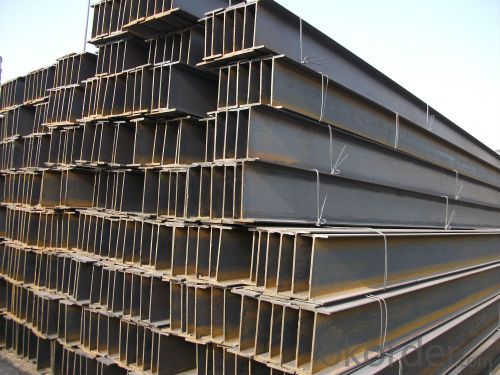
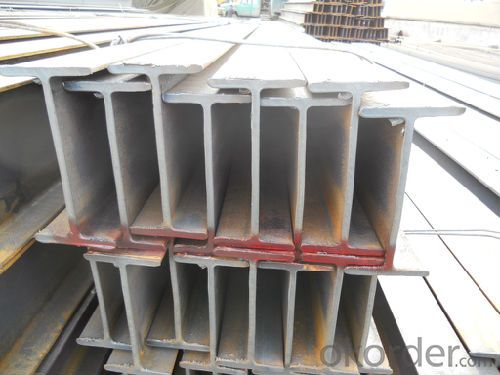
- Q: What are the different design guidelines or load tables available for Steel H-Beams?
- There are several design guidelines and load tables available for Steel H-Beams, which provide valuable information for engineers and architects to ensure the structural integrity and safety of their designs. These guidelines and load tables are based on extensive research, testing, and industry standards. One widely recognized source of design guidelines for Steel H-Beams is the American Institute of Steel Construction (AISC). AISC provides comprehensive design specifications, codes, and standards for structural steel construction, including H-Beams. Their publication, the AISC Manual of Steel Construction, contains detailed design guidelines for various types of steel members, including H-Beams. It covers topics such as design criteria, member capacities, connection design, and limitations. Load tables for Steel H-Beams can also be obtained from different manufacturers or suppliers of steel products. These load tables specify the allowable loads and deflections for different sizes and configurations of H-Beams. They are typically provided in the form of charts or tables that engineers can reference during the design process. Manufacturers often conduct extensive testing to determine the load capacities of their H-Beams, considering factors such as material properties, beam geometry, and loading conditions. Additionally, engineering software programs and online resources are available that can assist in the design of Steel H-Beams. These tools utilize mathematical models and algorithms to calculate the structural properties and load capacities of H-Beams based on user-defined parameters. They can provide immediate results and facilitate the design process by automatically considering factors such as beam size, material properties, and load combinations. It is important for designers to consult the appropriate design guidelines and load tables when working with Steel H-Beams, as they ensure that the beams are selected and designed to safely support the intended loads and maintain structural stability.
- Q: What are the considerations when designing for vibration control in Steel H-Beams?
- When designing for vibration control in Steel H-Beams, there are several important considerations that need to be taken into account. These include: 1. Material selection: Choosing the right type of steel for the H-Beam is crucial for effective vibration control. Steel with high stiffness and strength properties, such as high-strength low-alloy (HSLA) steel or carbon steel, is often preferred to minimize vibrations. 2. Structural design: The design of the H-Beam itself plays a significant role in vibration control. Factors such as the size and shape of the beam, the spacing and size of stiffeners, and the presence of additional bracing or damping elements need to be carefully considered to enhance the beam's vibration resistance. 3. Damping mechanisms: Incorporating damping mechanisms into the H-Beam design can help absorb and dissipate vibration energy. This can be achieved through the use of materials with inherent damping properties, such as composite materials or viscoelastic materials, or through the addition of tuned mass dampers or dynamic absorbers. 4. Dynamic loading conditions: Understanding the dynamic loading conditions that the H-Beam will be subjected to is essential for effective vibration control. This includes considering factors such as the frequency and amplitude of the vibrations, as well as any potential resonant frequencies that may occur. 5. Structural connections: Ensuring proper connections between the H-Beam and other structural elements is crucial for vibration control. Adequate stiffness and strength in the connections will help to minimize the transmission of vibrations through the structure. 6. Environmental factors: The environment in which the H-Beam will be located can also impact vibration control considerations. Factors such as temperature variations, humidity, and exposure to corrosive substances can affect the performance of the beam and its ability to resist vibrations. Overall, designing for vibration control in Steel H-Beams requires a comprehensive understanding of the structural dynamics involved, as well as careful consideration of material selection, structural design, damping mechanisms, loading conditions, connections, and environmental factors. By addressing these considerations, engineers can ensure that H-Beams are designed to effectively control vibrations and optimize the performance and safety of the structure.
- Q: Can steel H-beams be used for airport hangars?
- Yes, steel H-beams can be used for airport hangars. Steel H-beams are a popular choice for constructing hangars because they offer several advantages. Firstly, they are strong and durable, capable of withstanding heavy loads and adverse weather conditions. This is crucial for airport hangars as they need to provide a safe and secure shelter for aircraft. Additionally, steel H-beams are versatile and can be easily customized to suit the specific requirements of the hangar, such as the size, shape, and design. They also offer excellent fire resistance, which is essential for hangars where fuel and other flammable materials are present. Moreover, steel H-beams have a long lifespan, requiring minimal maintenance and reducing overall costs. Thus, using steel H-beams for airport hangars is a practical and efficient choice.
- Q: How do steel H-beams perform in sports arena construction?
- Sports arenas commonly use steel H-beams for their outstanding structural performance. These beams offer superior strength and load-bearing capabilities, making them perfect for supporting the heavy loads and stresses that sports arenas encounter. The design of steel H-beams promotes even weight distribution, enabling them to evenly distribute loads from the roof, lighting systems, and other equipment in the arena. This ensures the building's structural integrity and prevents any potential failures or collapses. Furthermore, steel H-beams possess a high resistance to bending and twisting forces, making them suitable for withstanding the dynamic loads generated by sporting events like basketball games or concerts. They also exhibit excellent fire resistance, which is crucial for ensuring the safety of both spectators and athletes. Moreover, steel H-beams are versatile and can be easily customized to meet the specific design requirements of sports arenas. Architects and engineers can fabricate them into various lengths, sizes, and shapes, allowing for the creation of innovative and aesthetically pleasing structures. Additionally, steel H-beams have a long lifespan and require minimal maintenance, making them a cost-effective choice for sports arena construction. They are also recyclable, aligning with sustainable construction practices. In conclusion, steel H-beams play a vital role in sports arena construction due to their exceptional strength, load-bearing capabilities, resistance to bending and twisting forces, fire resistance, versatility, and long lifespan. These beams ensure the safety and structural integrity of sports arenas, providing a solid foundation for hosting sporting events and other activities.
- Q: What is the maximum allowable camber for steel H-beams?
- The maximum allowable camber for steel H-beams is typically specified by the relevant industry standards or project specifications. The specific maximum allowable camber can vary depending on the size, grade, and intended use of the H-beam. It is important to consult these standards or specifications to determine the maximum allowable camber for a specific steel H-beam.
- Q: How do steel H-beams compare to I-beams in terms of strength?
- Steel H-beams and I-beams are commonly used in construction but differ in shape and design, resulting in varying load-bearing capacities. H-beams, also known as wide flange beams, possess a wider flange and narrower web compared to I-beams. This design enables H-beams to support heavy loads across a broader span, making them suitable for applications requiring greater strength and stability. The wider flange of H-beams enhances resistance against bending, torsional forces, and shear stress, making them well-suited for structures like bridges, buildings, and heavy machinery. Conversely, I-beams, also known as universal beams or rolled steel joists, possess a narrow flange and thicker web. This shape allows I-beams to resist bending and deflection, making them ideal for applications requiring long spans and minimal sagging. I-beams find common usage in residential and commercial construction, as well as in beam and column manufacturing. To compare the strength of H-beams and I-beams, it is essential to consider specific dimensions, material properties, and loading conditions. Generally, H-beams exhibit higher load-bearing capacities due to their wider flange and superior resistance against various forces. However, consulting structural engineers or referring to load tables is crucial for determining the appropriate beam type and size for a specific construction project. In summary, steel H-beams and I-beams are robust structural elements, with H-beams typically possessing higher load-bearing capacities due to their wider flange design. Nonetheless, the choice between H-beams and I-beams depends on the specific project requirements and loading conditions.
- Q: What are the cost implications of using Steel H-Beams in construction?
- The cost implications of using Steel H-Beams in construction can vary depending on several factors. Generally, steel H-beams are more expensive than other construction materials like wood or concrete. However, they offer numerous benefits such as high strength, durability, and versatility that can outweigh the initial cost. Additionally, steel H-beams require minimal maintenance, reducing long-term expenses. It's important to consider the overall project requirements, structural needs, and budget constraints to determine if steel H-beams are the most cost-effective choice for a particular construction project.
- Q: Can steel H-beams be used in wastewater treatment plant construction?
- Yes, steel H-beams can be used in wastewater treatment plant construction. They are commonly used in the construction of structural elements due to their strength and durability. Steel H-beams provide excellent support and stability, making them suitable for the demanding conditions found in wastewater treatment plants.
- Q: Can steel H-beams be used in retrofitting existing structures?
- Yes, steel H-beams can be used in retrofitting existing structures. Steel H-beams are commonly used in structural engineering and construction projects due to their strength and versatility. When retrofitting an existing structure, steel H-beams can be used to reinforce or replace weak or damaged load-bearing components such as columns, beams, or floor systems. This allows for the existing structure to be strengthened and brought up to current building codes and standards. Steel H-beams can also be used to add additional support or create new structural elements, such as mezzanine floors or roof extensions, in the retrofitting process. Overall, steel H-beams are a reliable and effective choice for retrofitting existing structures.
- Q: How do Steel H-Beams contribute to the overall fire safety of a building?
- Steel H-beams play a crucial role in enhancing the overall fire safety of a building. Firstly, steel is an inherently fire-resistant material due to its high melting point and low flammability. This makes H-beams an excellent choice for structural components, as they can withstand high temperatures and maintain their structural integrity during a fire event. One of the key contributions of H-beams to fire safety is their ability to resist the spread of fire within a building. Steel H-beams are typically used as load-bearing members in the construction of floors, roofs, and walls. In the event of a fire, the steel beams act as fire-resistant barriers, preventing the fire from spreading to other parts of the building. This compartmentalization is crucial in limiting the fire's impact and reducing the risk of structural collapse. Furthermore, steel H-beams have excellent thermal conductivity, meaning they conduct heat away from the fire source. This characteristic helps to minimize the heat transfer to other building elements, such as walls and floors, reducing the risk of fire spread and structural failure. The ability of steel to dissipate heat also helps to maintain the structural integrity of the H-beams themselves, preventing them from weakening or warping due to prolonged exposure to high temperatures. In addition to their fire resistance and heat dissipation properties, steel H-beams are also highly durable and robust. This durability ensures that the structural integrity of the building remains intact even after a fire incident. Unlike other materials, such as timber, steel does not degrade or lose its strength when exposed to fire, making it a reliable choice for fire-resistant construction. Moreover, steel H-beams can be designed to provide additional fire protection through the application of fire-resistant coatings or intumescent paints. These coatings create a protective layer that expands when exposed to heat, forming an insulating barrier that delays the transfer of heat to the steel beam. This extra layer of fire protection further enhances the fire safety of the building. In summary, steel H-beams contribute significantly to the overall fire safety of a building. Their inherent fire resistance, ability to resist fire spread, heat dissipation properties, durability, and the option for additional fire-resistant coatings make them a vital component in ensuring the structural integrity and safety of a building during a fire event.
Send your message to us
Galvanized H Beam with High Quality for Sale
- Loading Port:
- Tianjin
- Payment Terms:
- TT or LC
- Min Order Qty:
- 50 m.t.
- Supply Capability:
- 10000 m.t./month
OKorder Service Pledge
OKorder Financial Service
Similar products
Hot products
Hot Searches
Related keywords
